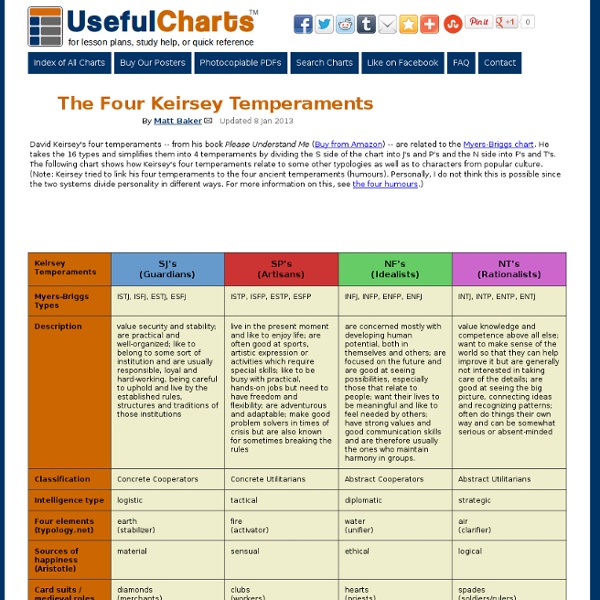



Integral Personality Complete relationship chart between psychological ("personality") types Complete relationship chart between psychological ("personality") types Chart #1 Key to the chart: Usage: Type A x Type B -> Intertype Relationship. Example #1: A = 'ENFp ', B = 'INFp ', Cross-reference result = 'Cnt'.Conclusion: Between ENFp and INFp there is Contrary Intertype Relationship. Example #2: A = 'ISTj ', B = 'ENTp ', Cross-reference result = 'Sp<'.Conclusion: Between ISTj and ENTp there is Intertype Relationship of Supervision, where ISTj is Supervisee to ENTp. Chart #2 Usage: Your [A] is [Intertype Relationship] to your [B]. Example #1: A = 'Qid', B = 'Act', Cross-reference result = 'Ego'.Conclusion: Your Quasi-identical is Super-Ego to your Activity Example #2: A = 'Bn<', B = 'Ego', Cross-reference result = 'Bn>'.Conclusion: Your Beneficiary is Benefactor to your Super-Ego.
PersonalDNA | Your True Self Revealed - Fast Fun Free Personality Tests 10 Brilliant Social Psychology Studies Ten of the most influential social psychology experiments explain why we sometimes do dumb or irrational things. “I have been primarily interested in how and why ordinary people do unusual things, things that seem alien to their natures.Why do good people sometimes act evil?Why do smart people sometimes do dumb or irrational things?” Like famous social psychologist Professor Philip Zimbardo (author of The Lucifer Effect: Understanding How Good People Turn Evil), I’m also obsessed with why we do dumb or irrational things. The answer quite often is because of other people — something social psychologists have comprehensively shown. Each of the 10 brilliant social psychology experiments below tells a unique, insightful story relevant to all our lives, every day. Click the link in each social psychology experiment to get the full description and explanation of each phenomenon. 1. The halo effect is a finding from a famous social psychology experiment. 2. 3. 4. 5. 6. 7. 8. 9. 10.
Abstract reasoning test - 123test.com <div class="alert alert-block alert-error"><h4>JavaScript</h4> For full functionality of this site it is necessary to enable JavaScript. Here are the <a href=" target="_blank"> instructions how to enable JavaScript in your web browser</a>. </div> An abstract reasoning test measures your ability or aptitude to reason logically. Abstract reasoning tests are almost always a part of any job assessment or intelligence testing setup. So, improve your IQ score with this free online abstract reasoning test. The test consists of ten questions.
Zodiac The twelve Zodiac signs are the twelve universal energies or spirits of this universe(some say omniverse). They give life or essence to our reality and are the forces behind all material manifestation. Each of the twelve signs contain or encapsulate a group of principles necessary for the functioning of life. These principles take form or expression through or via the physical planets which in turn influence the physical and spiritual centers(chakras and glands) of all life forms on those planets. Why twelve signs, and not eight or fifty? Because this is the universally agreed upon number for this time and/or creation. The most important zodiacs are 4 and its square(4,16,64,256,1024,etc). All of the twelve numbers and/or signs work together supporting and elucidating one another's meanings. How the Signs Work Togetheron a Spiritual or Esoteric Level How the Signs Work Togetheron a Practical or Day-to-Day Level
Your Personality | Free Online Personality Tests and Quizzes 100 Life Hacks That Make Life Easier Want to learn some quick and easy life hacks that are easy to do, low cost and saves you time? You’re in luck. We have collected 100 of these practical life hacks into this one big list that is easy to digest because they’re all images! By tweaking little things, it can make your life much easier. Enjoy!Want to learn some quick and easy life hacks that are easy to do, low cost and saves you time? Scroll down to continue reading article Read Next Source: Reddit LifeProTips There's More to Life. And access to our latest knowledge straight to your inbox daily. Aptitude tests, Assesment & IQ Training – Aptitude tests online – Fibonicci Top 40 Useful Sites To Learn New Skills The web is a powerful resource that can easily help you learn new skills. You just have to know where to look. Sure, you can use Google, Yahoo, or Bing to search for sites where you can learn new skills , but I figured I’d save you some time. Here are the top 40 sites I have personally used over the last few years when I want to learn something new. Hack a Day - Hack a Day serves up fresh hacks (short tutorials) every day from around the web and one in-depth ‘How-To hack’ guide each week.eHow - eHow is an online community dedicated to providing visitors the ability to research, share, and discuss solutions and tips for completing day-to-day tasks and projects.Wired How-To Wiki - Collaborate with Wired editors and help them build their extensive library of projects, hacks, tricks and tips.
Personality Club 50 Life Hacks to Simplify your World Life hacks are little ways to make our lives easier. These low-budget tips and trick can help you organize and de-clutter space; prolong and preserve your products; or teach you something (e.g., tie a full Windsor) that you simply did not know before. Most of these came from a great post on tumblr. 20. 40. Sources – muxedo task: 99 Life Hacks to make your life easier! If you enjoyed this post, the Sifter highly recommends: Personality Pathways 33 Meticulous Cleaning Tricks For The OCD Person Inside You